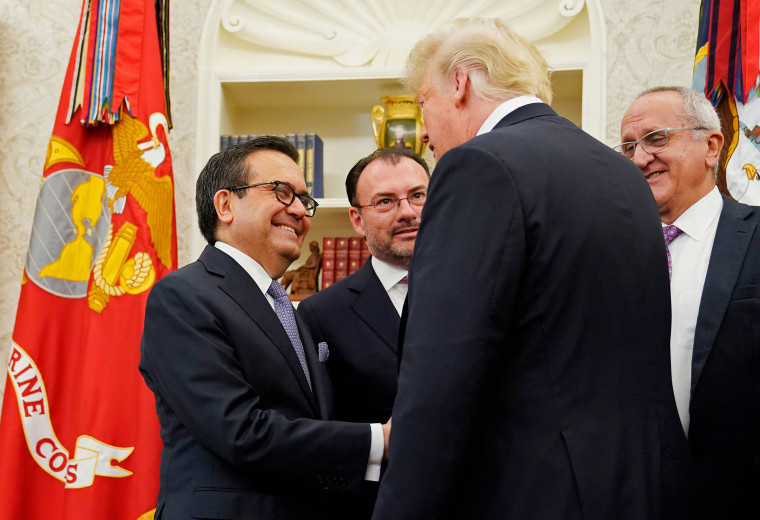President Donald Trump's initial trade deal with Mexico is raising concerns among automotive manufacturers and industry analysts who fear the cost of building cars, especially in Mexico, will surge. And, at a time when the U.S. new car market is already sliding after years of growth, that could either lead to a further slump in demand — or force manufacturers to absorb higher costs at the expense of profitability.
“Inevitably, this is going to be driving up costs,” said Joe Phillippi, a long-time Wall Street auto analyst who now runs AutoTrends Consulting. “You’re going to have to eat any increase as a manufacturer if you want to keep that merry-go-round going.”
Mexico is one of the largest of America’s trade partners, and the current North American Free Trade Agreement covers a wide range of goods and services. The same will be true when it comes to any new trade agreement, but autos make up a significant part of that cross-border trade and, if anything, have become even more important since NAFTA was originally put into effect on Jan. 1, 1994.
Back then, Mexico was an automotive backwater, largely focused on producing low-cost parts in a region just south of the border known as the maquiladoras. But over the last five years, Mexico has seen a surge in overall production, with more than a dozen manufacturers setting up assembly plants there, taking advantage not only of NAFTA but of the free trade agreements it has negotiated with a wide range of other countries.
Critics, including the United Auto Workers union (UAW), have complained loudly, insisting Mexico is stealing U.S. jobs, in part, by holding down the wages of its autoworkers. And that is something the White House claims the new deal will address. It also targets the broader questions of where car parts come from beyond the boundaries of North America.
The new deal would require that 75 percent of the value of the parts that go into a car covered by the agreement be made somewhere in North America, and that at least 40 percent of the total car be built in plants where workers are paid at least $16 an hour. In the U.S., that could affect a small number of plants producing low-value parts, though most workers here earn significantly more. In Mexico, however, the boom in automotive manufacturing hasn’t translated into a big payoff for employees. Those on the line at the new Audi plant reportedly earn as little as $2.25 an hour.
Exactly how much car prices will increase from the proposed agreement with Mexico will likely vary widely, according to industry analysts and insiders. The U.S. Automotive Policy Council, which represents the Detroit Big Three, said it would need to conduct “further study” as more details are released about the deal, and the industry still needs to know if and how Canada might fit into any replacement for NAFTA.
U.S.-Canada talks remain stalled, with Canadian Prime Minister Justin Trudeau telling reporters on Tuesday there are "a number of things we absolutely must see in a renegotiated NAFTA." Trump has said he may move ahead with a U.S.-Mexican deal that excludes Canada.
Even if Canada does come on board, automakers are worried, especially as they watch U.S. car sales tumble. New car sales set a record of around 17.4 million in 2016, marking a long recovery from the depths of the Great Recession. But demand slid by around 2 percent last year and has continued downward.
Anything that forces automakers to boost prices would likely accelerate the decline, warned analyst Phillippi, pointing to various parts of the Mexican deal, including higher wages.
“The price of labor is a critical part of the cost of the parts that go into your car — everything from axles to gears,” he said.
Complicating matters, automakers have already been slammed by Trump’s earlier decision to raise tariffs on imported aluminum and steel. By some estimates, that has added several hundred dollars to the price of even a product like the Toyota Camry assembled in Kentucky.
Manufacturers frequently compensate for fixed added costs by finding efficiencies, perhaps increasing automation. But they can only go so far and those increases “eventually, will be paid by American consumers,” said Michelle Krebs, a senior analyst with data tracking service AutoTrader.
Automakers do have the option of swallowing higher costs or, if they boost sticker prices, they could follow up with higher incentives. But both those options translate into lower earnings, analysts like Krebs and Phillippi point out.
Not everyone appears to be upset with the preliminary agreement. The UAW is betting that higher costs in Mexico could help justify bringing some auto jobs back to the U.S.
Meanwhile, Wall Street investors are trying to make sense of the ongoing NAFTA negotiations. They drove up auto shares last week following word of the Mexican agreement, but industry stock prices are now falling back, reflecting concern that if Canada doesn’t sign on, that could require an extensive makeover of a continent-wide auto parts and assembly network built up over the last quarter century.
